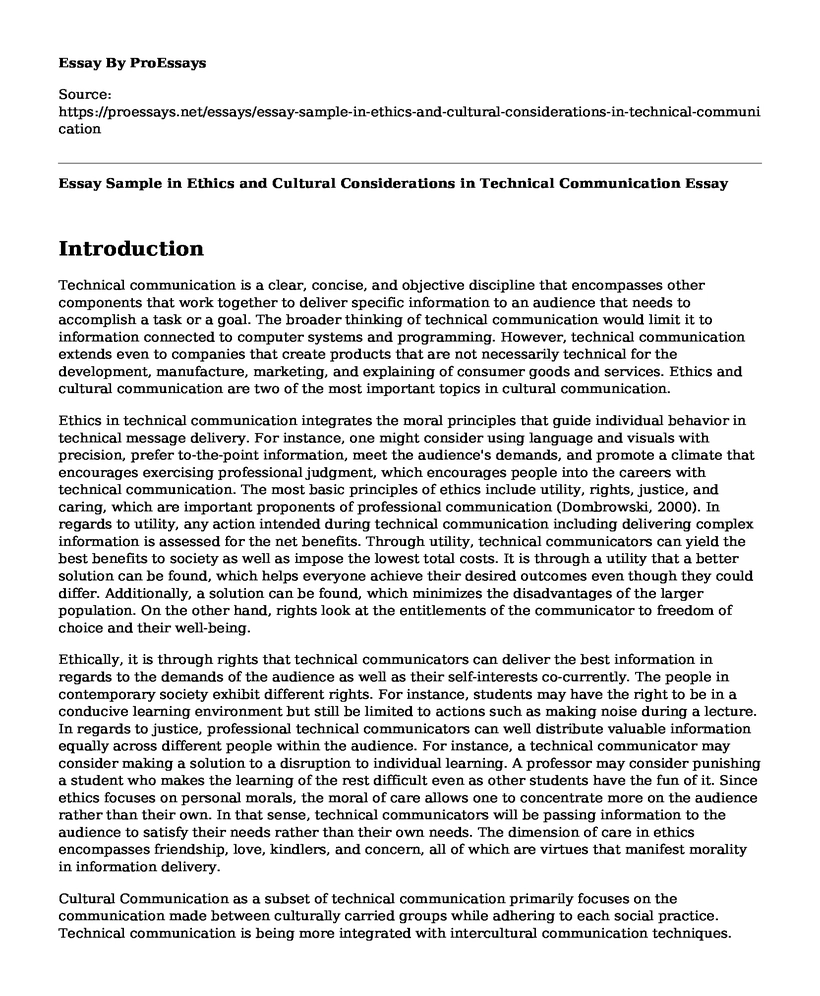Introduction
Technical communication is a clear, concise, and objective discipline that encompasses other components that work together to deliver specific information to an audience that needs to accomplish a task or a goal. The broader thinking of technical communication would limit it to information connected to computer systems and programming. However, technical communication extends even to companies that create products that are not necessarily technical for the development, manufacture, marketing, and explaining of consumer goods and services. Ethics and cultural communication are two of the most important topics in cultural communication.
Ethics in technical communication integrates the moral principles that guide individual behavior in technical message delivery. For instance, one might consider using language and visuals with precision, prefer to-the-point information, meet the audience's demands, and promote a climate that encourages exercising professional judgment, which encourages people into the careers with technical communication. The most basic principles of ethics include utility, rights, justice, and caring, which are important proponents of professional communication (Dombrowski, 2000). In regards to utility, any action intended during technical communication including delivering complex information is assessed for the net benefits. Through utility, technical communicators can yield the best benefits to society as well as impose the lowest total costs. It is through a utility that a better solution can be found, which helps everyone achieve their desired outcomes even though they could differ. Additionally, a solution can be found, which minimizes the disadvantages of the larger population. On the other hand, rights look at the entitlements of the communicator to freedom of choice and their well-being.
Ethically, it is through rights that technical communicators can deliver the best information in regards to the demands of the audience as well as their self-interests co-currently. The people in contemporary society exhibit different rights. For instance, students may have the right to be in a conducive learning environment but still be limited to actions such as making noise during a lecture. In regards to justice, professional technical communicators can well distribute valuable information equally across different people within the audience. For instance, a technical communicator may consider making a solution to a disruption to individual learning. A professor may consider punishing a student who makes the learning of the rest difficult even as other students have the fun of it. Since ethics focuses on personal morals, the moral of care allows one to concentrate more on the audience rather than their own. In that sense, technical communicators will be passing information to the audience to satisfy their needs rather than their own needs. The dimension of care in ethics encompasses friendship, love, kindlers, and concern, all of which are virtues that manifest morality in information delivery.
Cultural Communication as a subset of technical communication primarily focuses on the communication made between culturally carried groups while adhering to each social practice. Technical communication is being more integrated with intercultural communication techniques. Through intercultural communication, assessment can no longer be an issue with communicators (Hunsinger, 2006). Sound methods of assessment create a good foundation for students' learning and the quality of teaching. Therefore, cultural communication becomes an important integral in information delivery. Various intercultural competence assessment methods are important during communication. Intercultural communicators can communicate effectively and appropriately in different cultural situations in regards to individual intercultural knowledge, skills, and attitudes (Hunsinger, 2006). Furthermore, there is an ability to shift the frame of reference appropriately as well as being suited to good behavior in a cultural context. Through intercultural communication, technical communicators can also find the different behaviors as guided by culture and also embrace new behaviors from different culture even if it is unfamiliar.
In technical communication, sensitivity, awareness, and skills are the integrals needed for people to conceive intercultural competence in regards to effective, behavioral, and cognitive abilities (Hunsinger, 2006). Through sensitivity, communicators can better assess the audiences' desire to comprehend, appreciate, and value information regardless of cultural indifference. On the other hand, through awareness, the communicator can better understand the cultural conventions that exist and affect the way of thinking and behavior. Skills, on the other hand, points on the behavioral ability of an individual and their focus on communication skills even before they deliver particular information. These skills may include behavioral flexibility, interactional management, verbal, and non-verbal skills. These skills are well suited for intercultural interactions between various individuals. Through a good framework that integrates all the components of cultural communication, professional communicators can well conceive intercultural competence concerning cognitive, effective, and behavioral abilities. Through these considerations, communicators can well find and address the conceptual confusions that exist with intercultural competence.
Conclusion
It is important for technical communicators to consider ethics as well as intercultural dimensions in communication. Through ethics, they can better value their morals hence; deliver information in line with the desires of the audience. Besides, while considering intercultural dimensions, technical communicators can be effective at reaching out to the immediate goals and pre-defined outcomes in intercultural interactions. At the same time, they need to practice proper actions in their long-term intercultural relationships.
References
Dombrowski, P. (2000). Ethics in Technical Communication. The Allyn & Bacon Series in Technical Communication. Allyn and Bacon, 160 Gould St, Needham Heights, MA 02494.
Hunsinger, R. P. (2006). Culture and cultural identity in intercultural technical communication. Technical communication quarterly, 15(1), 31-48.
Cite this page
Essay Sample in Ethics and Cultural Considerations in Technical Communication. (2022, Nov 21). Retrieved from https://proessays.net/essays/essay-sample-in-ethics-and-cultural-considerations-in-technical-communication
If you are the original author of this essay and no longer wish to have it published on the ProEssays website, please click below to request its removal:
- Essay Example on Toxic Masculinity
- Evaluation Essay on Institute for Global Ethics
- Critical Incident in Social Work Essay Example
- Essay Sample on Parenting Styles on Developmental Outcomes
- Essay Example on Perceived Social Isolation and Loneliness: Unrequited Love to Rejection
- Essay on Exploring the Cultural Interactions of Individuals Through Daily Interactions
- Free Paper: Methods and Theories of Art History







